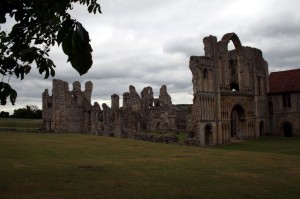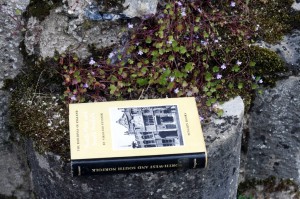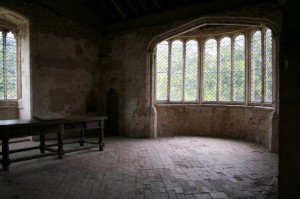On the trip with my Dad to Norfolk, we took in a couple ruined priories, as is our wont. After visiting the stalagmite remains of Thetford Priory, we visited the much more extant but nevertheless thoroughly ruined Castle Acre Priory. While entrance to Thetford Priory is free, Castle Acre is owned by English Heritage who charged us £5.60 each to visit it.
Walking around with Dad’s copy of Pevsner‘s North-West and South Norfolk, we came upon some Ivy-leaved Toadflax growing out of the ruined walls:
This beautiful little flower was first thought to be in the figwort family (Scrophularia) due to its flowers resembling members of that family. The leaves, however give it away and the Latin name had to be changed from Linaria cymbalaria to Cymbalaria muralis.
Walking around the Priory, trying to imagine it in full swing, one of the interpretative boards talked about it being inhabited by only about 30 Cluniac monks. One of the best preserved parts of the abbey is the Prior’s House section where the Prior had his private quarters and even a private chapel. As I had spent a great deal of time as a child rather uncritically tramping after my Dad round ruins and extant churches, I was surprised to find myself having a rather political reaction to the old empty rooms.
In an adjoining room to this picture, there was a huge fireplace and private chapel, to one side of which one of the priors had had a lovely ornate Gothic seat carved for himself and I suddenly thought – how corrupt, this fat (don’t know if he was but should have been), rich, politically powerful man, sitting at the top of the medieval food chain, above hundreds of peasants living in mud so that he could entertain his cronies. The thing that pushed me over the edge was imagining that in his world, he not only had all that ‘normal’ political power but on top of this, a claim to special access to and knowledge of divine wishes. As the first Baron Acton (1834–1902) wrote, “Power tends to corrupt, and absolute power corrupts absolutely. Great men are almost always bad men.” He and his correspondent, Bishop Mandell Creighton should know of course, being powerful men.



